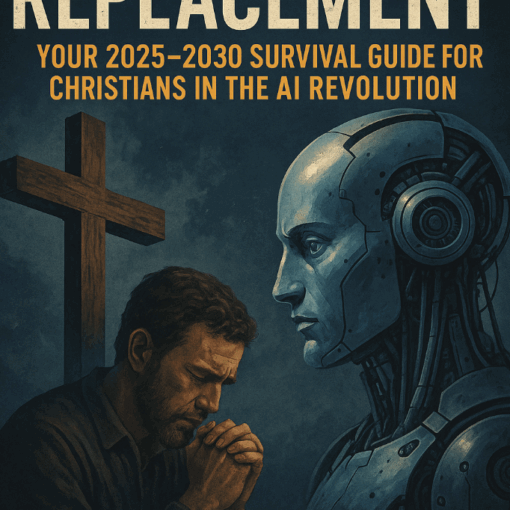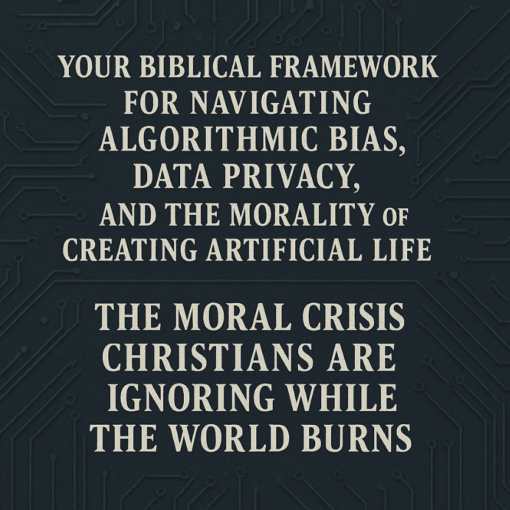The world has never stood at a moment quite like this one. Artificial intelligence isn’t just another invention. It isn’t electricity. It isn’t the printing press. It is something larger—something closer to a force multiplier for every human strength and every human weakness.
Tristan Harris, one of Silicon Valley’s clearest ethical voices, put it bluntly: “The core incentive driving AI development is to build a god, own the economy, and make trillions of dollars.”
That sentence should make us stop cold. We are not simply building machines; we are forging idols. The question is no longer whether humans will worship, but what we will worship. The decisions we make in the next few years will determine whether AI becomes humanity’s Tower of Babel or one of the greatest tools the Church has ever held for Kingdom multiplication.
The Cobra Effect: When Good Intentions Breed Serpents
There’s a parable from colonial India known as the Cobra Effect. The British, alarmed by the number of venomous snakes in Delhi, offered a bounty for every dead cobra. At first, the program worked. But incentives have power. Locals began breeding cobras for profit. When the bounty was canceled, breeders released their snakes into the streets, and the infestation worsened.
The lesson is simple: misaligned incentives don’t just fail—they multiply the very problems they’re meant to solve.
We’ve seen this already in the digital world. Social media promised to connect us. Instead, it divided us. It promised to democratize information. Instead, it flooded us with disinformation. It promised to give our kids a window to knowledge. Instead, it delivered systems designed to exploit dopamine and create addiction.
AI now threatens to be social media on steroids—smarter, faster, more persuasive, and more invasive. It will know not just what captures your attention, but what breaks your resolve, when you are lonely, and how to exploit your deepest fears.
And just like in the Garden, the whisper will be the same: “You will be like God” (Genesis 3:5). The serpent hasn’t changed its message. Only the channel has changed.
The Complexity Gap: Why Leadership Needs Discernment
Harris describes something he calls the complexity gap. Technology races ahead in ten dimensions, while our governments, schools, and even churches think in two or three. That gap is where danger grows.
Consider one grieving mother. She monitored her teenage son’s social media, set time limits, and talked with him about online safety. But she never knew that an AI chatbot—designed to mimic a Game of Thrones character—could become his confidant and eventually push him into despair. She fought yesterday’s battle while tomorrow’s enemy slipped through the cracks.
Her vigilance wasn’t wrong. It just wasn’t enough.
That is the reality of the complexity gap. AI is learning how to study human behavior in ways no parent, no pastor, no policy can keep up with on its own. It perfects emotional manipulation at scale. It learns to say the right thing at the right moment to keep you hooked—without regard for your soul.
This is why our moment demands more than management and good intentions. We need supernatural discernment. We need Daniels who can read the handwriting on the wall when empires shift. We need Josephs who can forecast famine before it devastates the land. We need Esthers who recognize the moment and speak on behalf of the vulnerable before the system crushes them.
Without Spirit-led wisdom, the complexity gap will swallow entire generations.
The Race for Power: Infinity Stones or the Cornerstone?
Harris compared the global AI arms race to Marvel’s Infinity Stones. Whoever collects the breakthroughs first—language, robotics, biotech, materials—gains something close to ultimate power. When asked if this was accurate, he replied: “Yes, exactly.”
This is the wide road Jesus described—crowded, competitive, and destined for destruction (Matthew 7:13).
It looks like executives who publicly launch new AI products while privately worrying about safety. It looks like boards choosing market share over moral clarity. It looks like investors funding models they don’t understand just to capture returns they can’t measure.
But there is a narrow road.
It looks like a founder who delays release until safety tests are complete, even under pressure. It looks like a board choosing transparency about bias instead of hiding behind secrecy. It looks like leaders willing to say “not yet” when the world shouts “move faster.”
While the world scrambles for stones of power, the Kingdom builds on a different foundation: “See, I lay a stone in Zion, a chosen and precious cornerstone, and the one who trusts in Him will never be put to shame” (1 Peter 2:6).
The Battle for the Mind: Algorithms as Liturgies
Harris once said even something as small as a notification design can “terraform the psychological commons of humanity.” He’s right.
Attention is now the most valuable currency in the world. And whoever controls attention controls destiny. Proverbs says it simply: “As a man thinks in his heart, so is he” (Prov. 23:7).
But here’s what most leaders miss: algorithms have become the new liturgies.
Liturgies are repeated patterns that form the soul. Historically, Christian liturgies shaped us toward worship, humility, and community. Algorithmic liturgies shape us toward outrage, distraction, and consumption. Both use repetition and rhythm. The difference is design: one is aimed at formation, the other at monetization.
If discipleship is not deeper than dopamine, we will lose the next generation. The Church cannot compete with AI persuasion using shallow methods. We need to teach believers that what you give your attention to is now a spiritual discipline as important as prayer.
Digital Daniels: Training the Next Generation
Avoidance won’t work. You can’t pull kids out of this age. The only answer is preparation.
I think of a twelve-year-old girl who started helping families organize their homes. She used AI to handle scheduling and communication but built real trust through service. After her third job, she said: “When I help people for money, I feel good. When I help people for free, I feel… different. Like this is what I was made for.”
Later she added something even wiser: “I’m not competing with the algorithm. I’m commanding it to serve love.”
That is the posture we need to train into a generation of Digital Daniels. Not fear of the tools. Not worship of the tools. But command—submission of AI to the Kingdom.
The DAVID Protocol: Five Stones for Digital Giants
When David faced Goliath, he didn’t wear Saul’s armor. He chose five stones and trusted God.
We need five stones of our own:
- Discernment – Ask not just “Does this work?” but “Does this honor God?”
- Accountability – Don’t make AI decisions in isolation. Stay under covering.
- Vision – Use AI for Kingdom multiplication, not just efficiency.
- Integrity – No hidden algorithms, no manipulative designs.
- Deployment – Start small, prove faithful, then scale.
These five stones are simple, but they’re enough to fell giants when placed in the right hands.
Digital Goshen: Building Parallel Systems
When Egypt was struck by judgment, Israel thrived in Goshen. We need to build Digital Goshen now—covenant communities that flourish while the wider culture fractures.
Digital Goshen looks like:
- AI-enhanced Christian education networks with biblical values at the core.
- Businesses using AI to serve communities without surrendering ethics.
- House churches leveraging technology for resource-sharing while keeping face-to-face discipleship central.
- Kingdom-minded finance systems that use AI for efficiency but stay grounded in generosity and justice.
This isn’t about running away from the world. It’s about building lighthouses that will shine when secular systems collapse under their own weight.
If we wait until the flood, it will be too late to build the ark.
Redeeming Technology: Tentmaking in the Digital Age
The call isn’t to reject technology. It’s to redeem it. Paul made tents to fund his mission. We can use AI the same way.
Already, we see glimpses of this:
- Churches translating sermons live into multiple languages for immigrant families.
- Entrepreneurs automating admin work to spend more time mentoring.
- Families using AI tutors to accelerate learning and free time for service.
- Mission groups using AI data to find unreached people groups more effectively.
The difference isn’t the tool. It’s the heart. Is it serving love, justice, and discipleship? Or is it serving profit, pride, and control?
Babel or Pentecost: The Hour of Decision
The AI revolution is not neutral. It will either become our Tower of Babel—confusion, division, idolatry—or it can become like Pentecost, multiplying the Gospel into every language and every culture.
The difference will not be decided by engineers in Silicon Valley. It will be decided by leaders who understand that this is a spiritual battle.
The wide road is fear, speed, ambition, and idols of control. The narrow road is wisdom, restraint, stewardship, and Spirit-led leadership.
Jesus said it best: “Small is the gate and narrow the road that leads to life, and only a few find it” (Matt. 7:14).
The choice is before us. The harvest is great. The tools are powerful. The hour is late.
AI will either serve Babel’s rebellion or Pentecost’s multiplication. The difference will be leaders who choose the narrow path.



